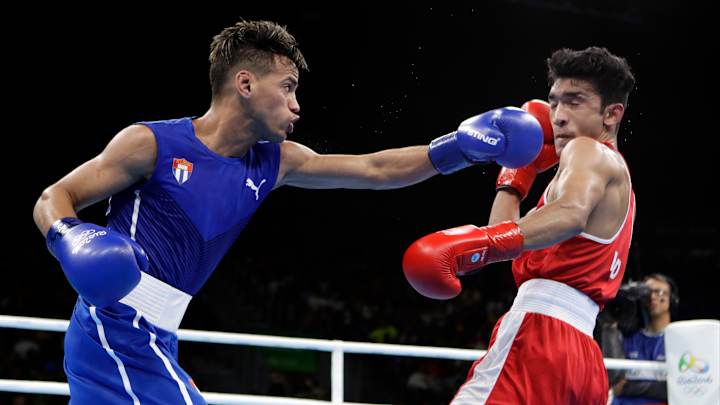Cuban boxers have same skills, but a sunnier attitude in Rio

RIO DE JANEIRO (AP) Robeisy Ramirez flummoxed his opponent for three Olympic rounds, landing precise punches and nimbly avoiding trouble. From bell to bell, the gold medalist showcased the same spectacular skills common to so many fighters from Cuba's matchless boxing institution over the previous half-century.
Ramirez then waved and pumped his fist at the cheering crowd before holding a long, gracious conversation with reporters from all countries.
That second part is, well, revolutionary.
The new generation of Cuban Olympic boxers in the Rio de Janeiro ring shares much with its glorious predecessors, from superb athletic talent to peerless technique.
What they don't share is the reticence, standoffishness and arrogance that characterized the dominant Cuban squads under famed coach Alcides Sagarra and his successors. The new stars also don't seem to care about the longtime restrictions, both spoken and unspoken, on Cuban athletes' interactions with the media, Olympic employees and even other competitors.
Just like its nation, Cuba's famed boxing team is opening up to the world.
''It's something we're doing on our own,'' said Joahnys Argilagos, the light flyweight world champion who received Olympic bronze Sunday. ''It's true we, the Cuban fighters, never spoke that much, but this is a new generation. We are getting around more. We have more information. We are more loose.''
Cuba sent two defending Olympic gold medalists to Rio, both fighting in new divisions. While Ramirez won Sunday, Roniel Iglesias lost a contentious bout to Uzbekistan's Shakhram Giyasov a day earlier, yet still stopped to speak thoughtfully and at length to reporters about the defeat.
When former world champion Lazaro Alvarez also lost a tight decision to Brazil's Robson Conceicao in the lightweight semifinals Sunday, he discussed it with the humility and patience showed by Ramirez.
''Everyone still has their choice whether they wish to speak to reporters, but I don't mind,'' Ramirez said. ''I know how it was in the past, but I like to talk about my fights. It's no problem for me.''
These Cubans also have a sense of humor. When heavyweight Erislandy Savon, the nephew of Felix, lost his heavyweight semifinal to clinch a bronze, he stormed past reporters from the West and Cuba - but then abruptly stopped and turned to say, ''Very sorry, but I have to go to doping control.''
Light heavyweight Julio Cesar La Cruz also blew off reporters Sunday after beating Brazil's Michel Borges to clinch a medal, but he grinned and shouted that he had to study his next opponent, who was in the following bout. La Cruz later returned and spoke at length.
''It is a normal evolution,'' Argilagos said. ''Nobody from one day to the next said, `Hey, let's start talking more.' It just came from us naturally.''
Sagarra ran the Cuban program for 3 1/2 decades until 2001, learning training methods from the Soviet Union and then Russia, and applying them to the island's best athletes. His fighters were restricted from interactions with others, and not just to combat the constant threat of defection.
Sagarra usually forbade interviews while the team was abroad, even for transcendent heavyweight three-time Olympic champions Teofilo Stevenson and Felix Savon. A perceived aloofness permeated their attitudes in the ring, where they often didn't celebrate or congratulate.
But much has changed in Cuba in the past four years - and not just with the so-called ''Cuban Thaw,'' which led to normalization of relations with the United States.
While their predecessors were forbidden from pro careers, some of the current Cuban Olympic fighters have spent the past three years traveling the world as participants in the World Series of Boxing, the professional team fight league set up by the International Boxing Association.
''It's a good opportunity to fight the best in the world,'' middleweight Arlen Lopez said. ''It helped us prepare for the same opponents at the Olympics.''
Cuba's decision to field a WSB team - nicknamed the Domadores, or Ringmasters - fulfilled a long-held goal of AIBA to present the island's brilliant boxing talents to the world more frequently than once every four years.
Cuba's program clearly faces challenges in adapting to AIBA's rule changes since the last Olympic cycle. Along with the absence of headgear, fights are no longer scored on a punch-counting system that played perfectly to the Cubans' superior athletic grace. That's forcing changes for Cuba, which has historically built on long jabs, precise counterpunching and an overall elusiveness that doesn't guarantee similar success under the new 10-point system.
Yet Argilagos claimed the 68th Olympic medal in Cuba's boxing history Sunday, and a handful of teammates are almost certain to follow.
''We have many good boxers,'' La Cruz said. ''Cuba has great fighters. This year is no different.''
